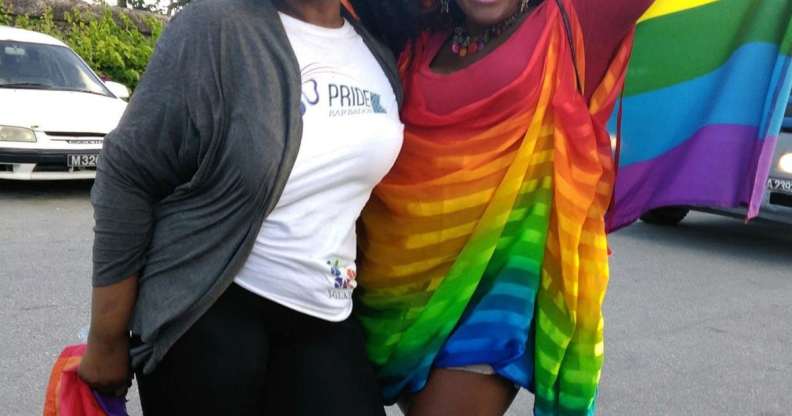Barbados holds first Pride parade and it’s as fabulous as you expect

The islanders of Barbados held their first Pride march in the capital of Bridgetown on Sunday, defying resistance from church authorities.
The pride parade saw more than 120 people—members of the local LGBT+ community, allies and even a few tourists—marching and dancing through the streets in all the fabulousness you can expect from the Caribbean location of 280,000 people famous for its carnival festivities.
“Amidst immense backlash, hurdles and fear of violent bigotry, we pushed through,” one of the march organisers, co-director of Barbados Gays & Lesbians Against Discrimination (B-GLAD), Ro-Ann Mohammed, wrote in a statement to PinkNews.

Ro-Ann Mohammed, co-director of Barbados Gays & Lesbians Against Discrimination (B-GLAD), hold the rainbow flag during the Pride parade (Courtesy of Ro-Ann Mohammed)
Religious opposition to the march was publicly expressed last week, when local church leaders called a press conference and claimed that support for the LGBT “agenda” is a form of “neocolonialism,” opposed to “the biblical narrative of Adam and Eve,” as local news outlet Barbados Today reported—although, of course, anti-sodomy laws were actually first imposed under British colonial rule.
Mohammed described in a Facebook post the months of preparations and worries over whether the authorities would issue the permit to hold the march—which, she wrote, was only approved two days before the event.
On the day of the parade, she was concerned the march could be the target of homophobic violence.
“The bigotry and venom that started pouring in during the days leading up to the parade left me so unbelievably scared,” she wrote.
Her fears, luckily, did not materialise.
“I was surprised by the amount of love and positivity that overwhelmed the air,” she said, adding: “Witnessing and being a part of history made all of the hassle—and still swollen feet—worth it.”

The march organisers celebrate the success of Barbados’ first pride (Courtesy of Ro-Ann Mohammed)
The significance of the event was summarised in the words of LGBT+ advocate Didi Winston. “It’s amazing. I am overwhelmed, I am happy beyond belief, I am proud, so damn proud to be a trans woman in Barbados, living my life, giving love and helping other and just be,” she told local news outlet NationNews during the march.
The need for a pride parade became particularly evident in October, when local LGBT+ activists organised a counter-protest to a religious group’s anti-gay march aiming to “reclaim the rainbow.” The counter-protest effectively turned into a mini-Pride parade.

Pride participants march in Barbados (Photo by Krystal Hoyte/The Nation. Courtesy of Ro-Ann Mohammed)
Barbados still criminalises homosexuality, with a maximum punishment of life imprisonment—although this is rarely enforced. The island’s Attorney General Adriel Brathwaite has said gay people in the country should be “left alone” but, at the same time, he also opposed same-sex marriage.
Barbados’ LGBT+ community has however received support from at least one member of the local Anglican church, father Clifford Hall. Addressing the crowd, he said there was no stopping the LGBT+ movement. “Don’t let anyone bully you, or torment you or terrorise you. They have had their day, yours is now and tomorrow and forever . . . . So, speaking as a priest, I say, ‘welcome all to the flock of Christ,’” he said, recorded in a video published in Caribbean news publication Loop.

